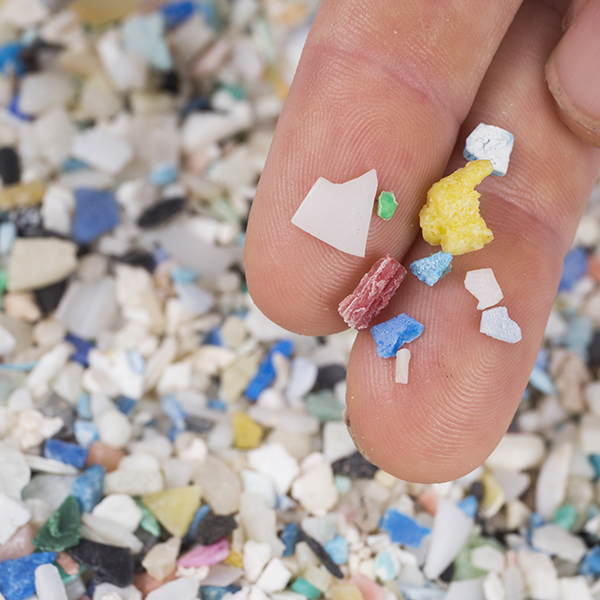Students will learn about the biology and ecology of a manatee as well as learn ways that humans impact and can protect manatees.
K-12 Education Resources
Microplastics
This page hosts resources for teachers interested in incorporating microplastics into their lesson plans or for informal educators looking for microplastics activities to do with youths.
Florida educators and students interested in getting more involved with microplastics sampling and outreach can also volunteer with the Florida Microplastic Awareness Project.

Resource Library
Consult our Suggestions for Teaching K-12 Youth about Microplastics.
Then, check out the Sea Grant-created curriculum/materials/resources below.
- Microplastics Curriculum
Three curricula developed for grades 8-12 that use NOAA’s Marine Microplastic Portal to guide teachers and students through topics such as marine microplastic sampling techniques, distribution of microplastic concentrations, and the discovery of marine microplastics through time.
Created by the Gulf of Mexico Sea Grant Science Outreach Team - Marine Microplastics Primer for Extension Professionals
This publication is intended to serve as a guide for extension professionals to aid in answering questions about microplastics that they have encountered or may encounter in the future. - Does It Sink or Float?
A simplified version of the activity “How Can Different Polymers be Identified?” (below) that has been used at elementary STEM fairs.
Created by Maia McGuire, Florida Sea Grant - Making Beeswax Wraps for Food
Created by Hawaii Sea Grant - Marine Debris STEAMSS Curriculum
Curriculum for grades 4-5, 6-8 and 9-12.
Created by Oregon Sea Grant with a NOAA Marine Debris Program grant - Nearpod Module on Microplastics for Grades 6-8
Created by Angela Greene, Ohio Sea Grant - Plastic Pollution and You
An interdisciplinary 15-lesson curriculum focused on a human-induced threat to the health of New York’s marine and freshwater aquatic
Created by New York Sea Grant - Sampling for Microplastics in Beach Sand
Protocol for upper elementary school-age through adult volunteers.
Created by Maia McGuire, Florida Sea Grant - Microplastics Awareness Activity (updated link coming soon)
This activity is great for elementary school science nights!
Created by Dr. Laura Tiu, Florida Sea Grant - Sea Turtle Lesson 6: How Do Human Activities Affect Sea Turtles?
This lesson from Florida Sea Grant’s 5th grade sea turtle curriculum contains several marine-debris-related activities. - Mitigating Microplastics
Curriculum for grade 6-8 that includes three lessons intended to engage 6-8 grade students with the issue of microplastics in the ocean, analyzing both the problem and possible solutions. The lessons are structured to include opportunities for student inquiry, as well as collaboration and engagement with real data collected by scientific researchers working in the field. Each lesson includes an estimated length, which will vary by classroom. The entire curriculum is designed to take about one week, but may be extended by including a project at the end of the curriculum.
Created by Oregon Sea Grant - “Me and Debry”
A half-hour, whimsical, audience participation theatrical performance about marine debris.
Created by Wisconsin Sea Grant
- What Are Microplastics? Infographic
The link above downloads a .zip file that contains a JPG and PDF file of the infographic.
Created by UF/IFAS Communications Services - Bioplastics—A Better Option For The Environment? Fact Sheet
- Microplastics Pollution—What is it? (Naturally Florida Podcast Episode)
- Follow National Geographic’s Friendly Floatees
In this activity, middle school students follow the path of the Friendly Floatees, a shipment of 29,000 rubber ducks that spilled overboard in 1992. - Engineering for Good: Plastic Solutions
Three-week project-based learning module for middle school students focused on developing solutions for negative impacts of plastics on the environment. NGSS-correlated. - How Can Different Polymers be Identified?
Lab activity for 5th to 10th grade. - Plastic Pirates
Curriculum covering a variety of topics related to plastic and plastic pollution. There is a summary for teachers at the end of each chapter with difficulty level and time needed for each of the activities within the chapter.
Created by the German Ministry of Education - Marine Debris Toolkit for Educators
One of many educational materials available from NOAA’s Marine Debris Program. - Ocean Plastics Academy
Developed in collaboration with a broad coalition of educators, scientists and industry experts, Ocean Plastics Academy combines a suite of curriculum-aligned resources with practical activities that help schools radically reduce their use of single-use plastics. The resources have been designed to teach ages 5-16, aligned to the National Curriculum for England programmes of study for Science, Geography and Design & Technology. - Plastic Challenge
This series of lessons for grades 2-11 is designed to extend students’ knowledge and understanding of plastics and plastic waste on a global scale. The lessons target students in elementary, middle, or high school. - PlasticSeas
In 2018, EarthEcho sponsored an expedition for teachers to investigate the topic of plastic pollution in Australia. A series of lesson plans (most designed for middle school, but one is for high school students) is available for download from the website. Lessons are correlated to Australian education standards and NGSS. - Educator’s Guide to Marine Debris: Southeast and Gulf of Mexico
A guide that has many great marine debris-related activities for teachers. - Volvo Ocean Race Plastic Pollution Curriculum
Presentations, active learning components in teachers guide, worksheets and booklets. Available in 6 different languages and suitable for ages 6-12. - Washed Ashore Integrated Arts Marine Debris Curriculum
A 12-lesson curriculum that connects science and art to help students understand the plastic pollution problem and communicate about it through art.
Microplastics Education Videos
Microplastics Education Videos
Explore More Lesson Plans
Students will learn about the biology and ecology of cetaceans (whales and dolphins), and learn ways that humans impact and can protect cetaceans.
Students will learn about the biology and ecology of sea turtles and the ways that humans impact and can protect them.